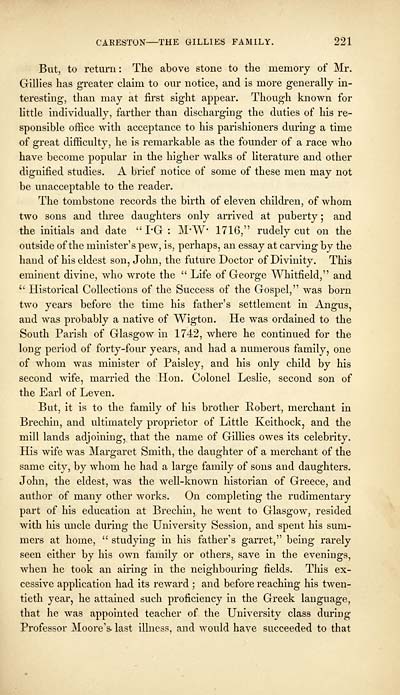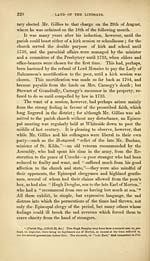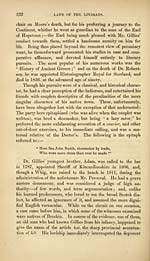Download files
Complete book:
Individual page:
Thumbnail gallery: Grid view | List view

CARESTON — THE GILLIES FAMILY. 221
But, to return : The above stone to the memory of Mr.
Gillies has greater claim to our notice, and is more generally in-
teresting, than may at first sight appear. Though known for
little individually, farther than discharging the duties of his re-
sponsible office with acceptance to his parishioners during a time
of great difficulty, he is remarkable as the founder of a race who
have become popular in the higher walks of literature and other
dignified studies. A brief notice of some of these men may not
be unacceptable to the reader.
The tombstone records the birth of eleven children, of whom
two sons and three daughters only arrived at puberty ; and
the initials and date " LG : M-W- 1716," rudely cut on the
outside of the minister's pew, is, perhaps, an essay at carving by the
hand of his eldest son, John, the future Doctor of Divinity. This
eminent divine, who wrote the " Life of George Whitfield," and
" Historical Collections of the Success of the Gospel," was born
two years before the time his father's settlement in Angus,
and was probably a native of Wigton. He was ordained to the
South Parish of Glasgow in 1742, where he continued for the
long period of forty-four years, and had a numerous family, one
of whom was minister of Paisley, and his only child by his
second wife, married the Hon. Colonel Leslie, second son of
the Earl of Leven.
But, it is to the family of his brother Robert, merchant in
Brechin, and ultimately proprietor of Little Keithock, and the
mill lands adjoining, that the name of Gillies owes its celebrity.
His wife was Margaret Smith, the daughter of a merchant of the
same city, by whom he had a large family of sons and daughters.
John, the eldest, was the well-known historian of Greece, and
author of many other works. On completing the rudimentary
part of his education at Brechin, he went to Glasgow, resided
with his uncle during the University Session, and spent his sum-
mers at home, " studying in his father's garret," being rarely
seen either by his own family or others, save in the evenings,
when he took an airing in the neighbouring fields. This ex-
cessive application had its reward ; and before reaching his twen-
tieth year, he attained such proficiency in the Greek language,
that he was appointed teacher of the University class during
Professor Moore's- last illness and would have succeeded to that
But, to return : The above stone to the memory of Mr.
Gillies has greater claim to our notice, and is more generally in-
teresting, than may at first sight appear. Though known for
little individually, farther than discharging the duties of his re-
sponsible office with acceptance to his parishioners during a time
of great difficulty, he is remarkable as the founder of a race who
have become popular in the higher walks of literature and other
dignified studies. A brief notice of some of these men may not
be unacceptable to the reader.
The tombstone records the birth of eleven children, of whom
two sons and three daughters only arrived at puberty ; and
the initials and date " LG : M-W- 1716," rudely cut on the
outside of the minister's pew, is, perhaps, an essay at carving by the
hand of his eldest son, John, the future Doctor of Divinity. This
eminent divine, who wrote the " Life of George Whitfield," and
" Historical Collections of the Success of the Gospel," was born
two years before the time his father's settlement in Angus,
and was probably a native of Wigton. He was ordained to the
South Parish of Glasgow in 1742, where he continued for the
long period of forty-four years, and had a numerous family, one
of whom was minister of Paisley, and his only child by his
second wife, married the Hon. Colonel Leslie, second son of
the Earl of Leven.
But, it is to the family of his brother Robert, merchant in
Brechin, and ultimately proprietor of Little Keithock, and the
mill lands adjoining, that the name of Gillies owes its celebrity.
His wife was Margaret Smith, the daughter of a merchant of the
same city, by whom he had a large family of sons and daughters.
John, the eldest, was the well-known historian of Greece, and
author of many other works. On completing the rudimentary
part of his education at Brechin, he went to Glasgow, resided
with his uncle during the University Session, and spent his sum-
mers at home, " studying in his father's garret," being rarely
seen either by his own family or others, save in the evenings,
when he took an airing in the neighbouring fields. This ex-
cessive application had its reward ; and before reaching his twen-
tieth year, he attained such proficiency in the Greek language,
that he was appointed teacher of the University class during
Professor Moore's- last illness and would have succeeded to that
Set display mode to:
![]() Universal Viewer |
Universal Viewer | ![]() Mirador |
Large image | Transcription
Mirador |
Large image | Transcription
Images and transcriptions on this page, including medium image downloads, may be used under the Creative Commons Attribution 4.0 International Licence unless otherwise stated. ![]()
| Histories of Scottish families > History and traditions of the land of the Lindsays in Angus and Mearns > (239) Page 221 |
|---|
| Permanent URL | https://digital.nls.uk/94871894 |
|---|
| Description | A selection of almost 400 printed items relating to the history of Scottish families, mostly dating from the 19th and early 20th centuries. Includes memoirs, genealogies and clan histories, with a few produced by emigrant families. The earliest family history goes back to AD 916. |
|---|

